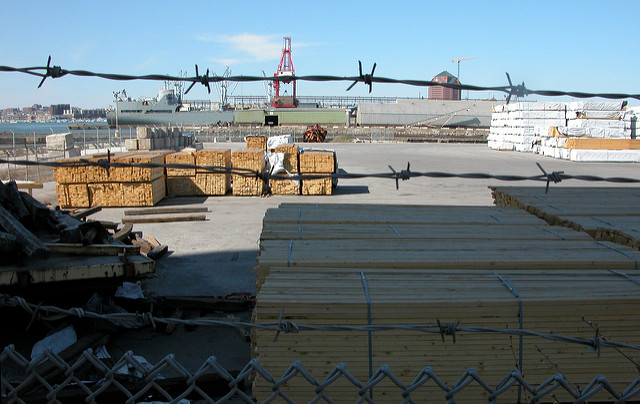Business and Economy
Trump takes first swing in lumber war: tariff of 20 per cent on Canadian lumber

The move was expected: the deep-rooted dispute over lumber pricing between the two countries has led to once-a-decade trade skirmishes over the issue, resulting in American duties, then the inevitable court battles, and ultimately negotiated settlements. (Photo: Doc Searls/ Flickr)
The United States has fired the opening shot in the latest softwood-lumber war against Canada, with the Trump administration announcing its first batch of duties on imported wood in the neighbourhood of 20 per cent.
The move was expected: the deep-rooted dispute over lumber pricing between the two countries has led to once-a-decade trade skirmishes over the issue, resulting in American duties, then the inevitable court battles, and ultimately negotiated settlements.
What wasn’t expected Monday was the enthusiasm with which the new American administration flung itself into the lumber hostilities, touting its incoming countervailing duties as an example of U.S. President Donald Trump’s tough, America-first trade posture.
Trump underscored the impending move by announcing it to a gathering of conservative media on the eve of the expected announcement. Commerce Secretary Wilbur Ross also highlighted it in an interview.
Then came a statement that said U.S. Customs will begin collecting cash deposits from Canadian logging companies because they receive a range of subsidies –most of them around 20 per cent.
What comes after the countervailing duties is a study of possible anti-dumping duties, followed by a final determination by the U.S. Commerce Department as early as Sept. 7, and one of three possible outcomes: an agreement, a surprise retreat from the U.S. government or potential years-long court battles.
It will all play out amid the backdrop of a bigger trade file: the renegotiation of the North American Free Trade Agreement.
America’s lumber lobby applauded the announcement.
“We are pleased with this initial outcome and are looking forward to the (next, anti-dumping) duties expected to be announced June 23,” said Zoltan van Heyningen of the U.S. Lumber Coalition.
“Since this is an ongoing matter, we are limiting our comments to our press release.”
A late-evening statement from the U.S. administration accused companies of benefiting subsidies ranging from three per cent by J.D. Irving Ltd., to 12.82 per cent for Resolute FP Canada, Ltd., to 20.26 per cent for Canfor Corp., to a high of 24.12 per cent for West Fraser Mills, with most others coming in at 19.88 per cent.
Duties will be collected retroactively, too –the U.S. says it will gather them for the previous 90 days. Industry analysts expect the combined duties, Monday’s and the upcoming ones, to range between 30 and 40 per cent.
In Canada, pressure will mount on the federal government.
The government has adopted an a understated, under-the-radar approach to dealing with Trump. But now as it responds to the U.S. move, it must juggle ongoing softwood negotiations, upcoming NAFTA renegotiations, and a frustrated industry at home.
There are already requests for it to provide financial help for Canada’s forestry sector. A government source said conversations are underway, but there won’t be an immediate announcement on that front.
The Canadian government will wait to see the details of various punitive measures before calculating the aid amount. It took the federal government more than a year to announce the first of two aid packages after duties were imposed in 2001.
It first gave more than $300 million in late 2002 and then $1.5 billion in November 2005, with $900 million for loan insurance to help financially strapped exporters that had more than $5 billion tied up in duties.
“(The aid determination) really can’t be made until we’ve seen what the rate and penalty will be,” said an official who declined to be identified because they were not authorized to speak publicly.
Quebec Economic Development Minister Dominique Anglade urged Ottawa to help forest companies, but said Monday the province will act immediately: “Day 1, we will be there to support the industry,” she said in an interview.
Meanwhile, Ontario named former federal trade minister Jim Peterson as its chief softwood lumber negotiator on Monday. He joins former federal cabinet minister David Emerson who represents B.C. and former U.S. ambassador Raymond Chretien who is Quebec’s negotiator.
Unifor president Jerry Dias called on Ottawa to respond to the duties to avoid a repeat of the situation when 15,000 were laid off within months of a combined duty of 27 per cent being imposed in the early 2000s.
“It’s hard to exaggerate the impact tariffs will have on hundreds of small communities. The federal government needs to have a plan in place and act swiftly,” he said in a news release.
However, provinces aren’t in total agreement about financial support.
British Columbia has said it is cautious out of fear that assistance will be construed by the Americans as unfairly helping the Canadian industry. B.C. producers such as West Fraser Timber and Canfor are in a stronger position to weather a U.S. trade battle because they have purchased sawmills in the U.S. and expanded exports to China.
In Central Canada, sawmills tend to be smaller, don’t have as much cash flow to pay duties and are therefore more at risk of closing, experts say. That’s why Ontario and Quebec producers have been pushing Ottawa to provide loan guarantees to help them pay duties and stay in business.





















